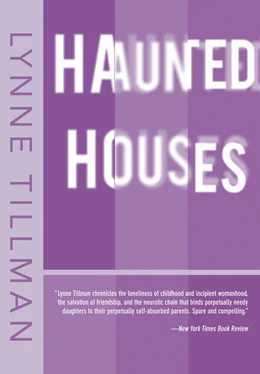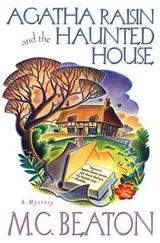Lynne Tillman - Haunted Houses
Здесь есть возможность читать онлайн «Lynne Tillman - Haunted Houses» весь текст электронной книги совершенно бесплатно (целиком полную версию без сокращений). В некоторых случаях можно слушать аудио, скачать через торрент в формате fb2 и присутствует краткое содержание. Год выпуска: 2011, Издательство: Red Lemonade, Жанр: Современная проза, на английском языке. Описание произведения, (предисловие) а так же отзывы посетителей доступны на портале библиотеки ЛибКат.
- Название:Haunted Houses
- Автор:
- Издательство:Red Lemonade
- Жанр:
- Год:2011
- ISBN:нет данных
- Рейтинг книги:5 / 5. Голосов: 1
-
Избранное:Добавить в избранное
- Отзывы:
-
Ваша оценка:
- 100
- 1
- 2
- 3
- 4
- 5
Haunted Houses: краткое содержание, описание и аннотация
Предлагаем к чтению аннотацию, описание, краткое содержание или предисловие (зависит от того, что написал сам автор книги «Haunted Houses»). Если вы не нашли необходимую информацию о книге — напишите в комментариях, мы постараемся отыскать её.
, Tillman wries of the past within the present, and of the inescapability of private memory and public history. A caustic account of how America makes and unmakes a young woman.
Haunted Houses — читать онлайн бесплатно полную книгу (весь текст) целиком
Ниже представлен текст книги, разбитый по страницам. Система сохранения места последней прочитанной страницы, позволяет с удобством читать онлайн бесплатно книгу «Haunted Houses», без необходимости каждый раз заново искать на чём Вы остановились. Поставьте закладку, и сможете в любой момент перейти на страницу, на которой закончили чтение.
Интервал:
Закладка:
“Why do you hang around with Jimmy if it makes you feel so awful?” Sinuway asked. “It doesn’t,” Jane said. The next night she was in Jimmy’s antique store, the one he owned with an older man, a lover of men, Sinuway called him. Maurice always gave Jane dirty looks, but tonight he gave her especially dirty looks because he was tripping. Jane was a freshman in college, and Maurice hated college girls. Jane was sitting on the floor, reading, and Maurice was staring at a vase and talking about The Golden Bowl , which Jane had not read. Upon hearing that Jane had not read James’s classic, Maurice swelled, his face becoming a bright red, and he attempted to tear her apart with language. Felix, Jimmy’s Swiss painter friend, walked in just as Maurice was reaching his climax: “Stupid college girls in pea jackets.” Felix grabbed Jane’s hand, told Maurice to shut up, and they walked out.
“Let’s go for coffee. You shouldn’t listen to that shit, Jane,” Felix said. “He’s in love with Jimmy and he hates it every time you walk into that shitty antique store.” Felix enjoyed saying shit. They’d met a couple of times, but they’d never talked. “Jimmy’s an old friend,” Jane said, “it’s not like that between us.” Felix whooped, or so it sounded to Jane. “Jimmy’s a weird guy, you know. You may have come from the same town, but that’s shit.” Jane wondered why she’d never really looked at Felix before, while he grew to look more and more like Sinuway though he was skinny and tall, and Sinuway broad and short. Jane was uneasy with him. He announced unexpectedly, “I like you. Has Jimmy ever told you that?” Jane just looked at him. “You can visit me sometimes, I don’t ask anyone, and if I’m busy I’ll tell you. No shit, okay?” Jane said okay, and took the bus home.
Sinuway disappeared. She said she was going to leave and she did; all along it had been inevitable, Jane thought, and I didn’t take her seriously, Sinuway left no clues to her whereabouts and even Carl knew nothing about what had happened to her, or if she had gotten married to the professor no one had ever met, or what. Carl and Jane spent some desultory evenings drinking weak coffee in restaurants. Their connection was altered, then broken, by Sinuway’s absence. It was as if there had been nothing between them at all. After a while they drifted out of each other’s lives, the parting having no particular shape. Jane was used to absence and disappearance, her sisters’ boyfriends coming and going. Lois going. It was like Sinuway was dead and all that was left was the mirror she’d given Jane.
“You’re perfect,” Felix told Jane, as they ate a cheap breakfast on First Avenue New Year’s morning, “you’re perfect except for sex.” Jane made no claims on Felix, which he attributed to her being a virgin and fucked-up, the way he thought all American girls from the suburbs were. She’d visit his studio and sit in the corner, read a magazine or something from school, then leave without saying when she’d be back. Sometimes he’d want her to pose for him, because he couldn’t afford models, but she wouldn’t want to pose in the nude. He’d rant and rave in his funny accent and she’d undress halfway, the way Dorothy Parker walked out halfway when Alexander Woollcott told an anti-Semitic joke because she was half Jewish. Felix would paint for a while, then slam down his brushes, demanding total nudity. Jane would walk out, fast and silent. Then Felix would run after her and tell her she was right, he had no right to demand anything of her that she didn’t want to do.
Jimmy was running an avant-garde movie house, the antique store having gone bust, but Maurice was still in the picture as were Jimmy’s parents, who supported all his projects. Jane met Jimmy’s mother on the LIRR one day when she was returning from an infrequent visit with her parents. His mother quizzed her about Jimmy, as if Jane knew a secret that everyone knew but his parents. They wanted to know about Maurice. “Jimmy’s always liked you, Jane,” the mother said too evenly. Then she looked into Jane’s eyes and said, “Young people have to experience things their own way. I’m sure Jimmy will be all right, aren’t you?” Jane said she was certain Jimmy would be all right, as if she was agreeing about his getting over an illness she wasn’t sure he had or if he had it, was it a disease? But she was forced to comfort Jimmy’s mother for, though she appeared composed in her elegant going-to-the-city suit, everything was so close to the surface, it looked like her makeup might crack up and fall off and her tailored clothes come apart at the seams. Jane didn’t tell Jimmy that she had seen his mother. Later she cooked him too much spaghetti and they got stoned. Then they went to his theater, where he was showing a French film about slaughterhouses, and Jane left after the first scene when the butcher hit the horse on the head and the horse’s legs went out from under him and he was dead.
Perfect except for sex, Felix was thinking. He got undressed and placed his cock in her small hands and said, “For you, Jane,” and his cock lay rigid in a grip that barely held it and then only for a little while. “No one will ever do this with you, the way I’m doing,” he said. “We’ll do whatever you want.” “I don’t want to do anything,” Jane said. She was remembering that the last time she was with Jimmy he said to her, “You want to make love with me, don’t you?” But he said it as if it were a dare and Jane didn’t feel daring. “You’re always thinking about Jimmy,” Felix said. “I can tell by that shitty look you get on your face.” “Let’s go see a movie and eat some chocolate,” Jane answered. “Oh, your hips — Jane — oh, your diet. I love your hips.” Europeans were great to be around, Jane thought, if you’re fat. They think you’re like a Rubens or a Renoir, just a happy voluptuary. Then he looked at her, so determined, and said, “Okay, let’s go to a movie,” and he put his clothes back on.
It went like that the winter after Sinuway left. When Jane imagined Sinuway alive, she imagined her living in a different part of the city, like the Upper West Side, with or without the professor she did or did not marry. There were echoes everywhere. She wrote in her diary: Something remembered is invisible. What did I think about BEFORE, when I was young? I’m part of what I was thinking about then but it’s not there anymore. The sum of my parts is invisible. Jane liked that line, “sum of my parts,” a person could be added to or subtracted from, or a person could add up to anything. Or not. “She didn’t amount to much.” “It didn’t amount to much.”
The doorbell rang unexpectedly. She was thinking, in the shower, and nearly didn’t respond. Throwing on a robe, she asked who it was and she heard him say: Your father. She opened the door partway, and said she couldn’t talk, that she was late. Only later did she realize that she hadn’t taken the chain lock off the door.
She thought about Lois the way some people keep Holden Caulfield in mind, to check their humanity, to see if they’re still young. Jimmy teased her about her passion to remember, while other people, he told her, have a passion to forget. “It’s almost a mission for some people — to forget.” He said this to her while she studied Spinoza, on speed. He was looking at imperceptible progress. The sister she shared the apartment with was out of town, and Jimmy could stay all night if he wanted. She wanted him to. Jimmy stared at her as she read and she found it comforting. “What do you think of Spinoza?” he asked as she was leaving for school. “I think it doesn’t matter what I think. Either I’m crazy or everything is going in circles.” “That’s philosophy. You’re not crazy.” Her legs began to shake. She hadn’t taken much speed since she’d kicked the habit, in a manner of speaking, because she wouldn’t have put it that way, then. The subway ride was hell. By the time she got to class, and was handed the test by the sincere Catholic poet/philosopher who led the class, and thought on his feet in front of them like a performing seal trained to wonder why, she could barely remember anything. Mr. Arnold walked over to her and suggested she start writing. She looked at him, benignly, and something snapped so that she lifted her ballpoint pen and her hand began moving as if she were doing automatic writing. “You shouldn’t do speed at all,” Jimmy said. “You’re one to talk,” Jane said. He said he could handle it and that he didn’t have to take tests about Spinoza. Jane thought about dropping out.
Читать дальшеИнтервал:
Закладка:
Похожие книги на «Haunted Houses»
Представляем Вашему вниманию похожие книги на «Haunted Houses» списком для выбора. Мы отобрали схожую по названию и смыслу литературу в надежде предоставить читателям больше вариантов отыскать новые, интересные, ещё непрочитанные произведения.
Обсуждение, отзывы о книге «Haunted Houses» и просто собственные мнения читателей. Оставьте ваши комментарии, напишите, что Вы думаете о произведении, его смысле или главных героях. Укажите что конкретно понравилось, а что нет, и почему Вы так считаете.












